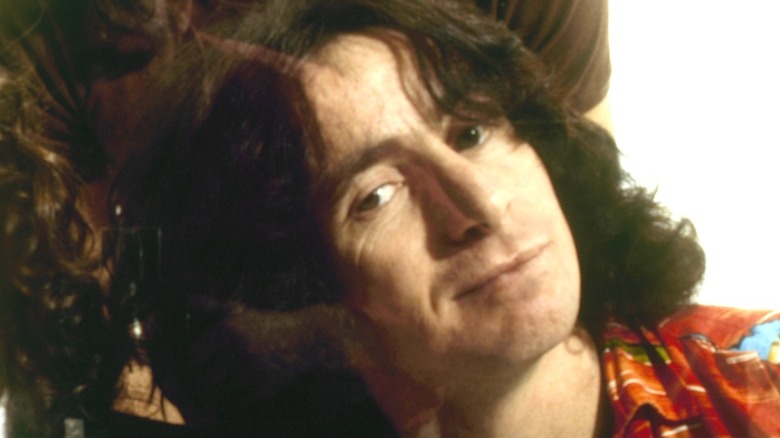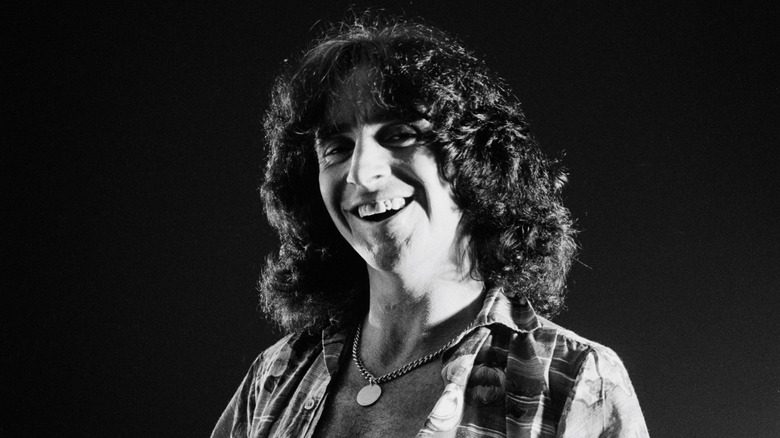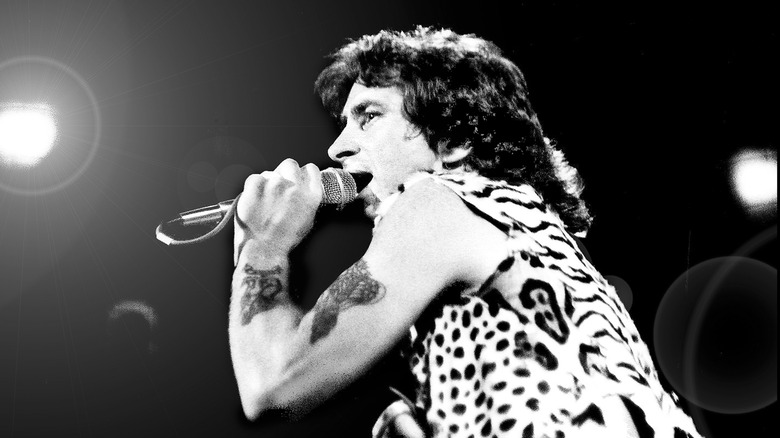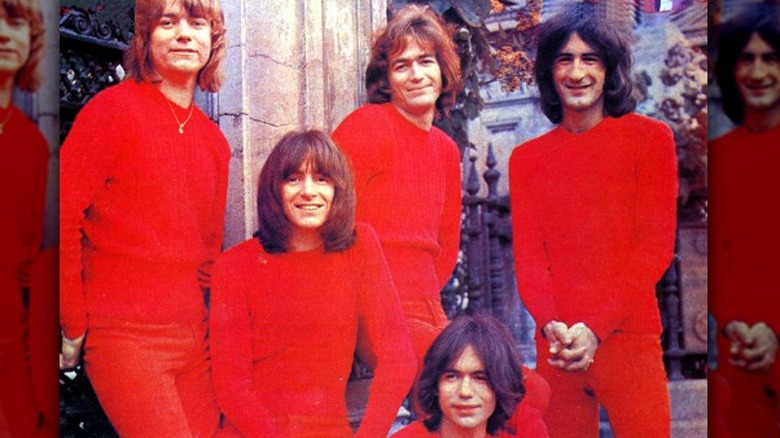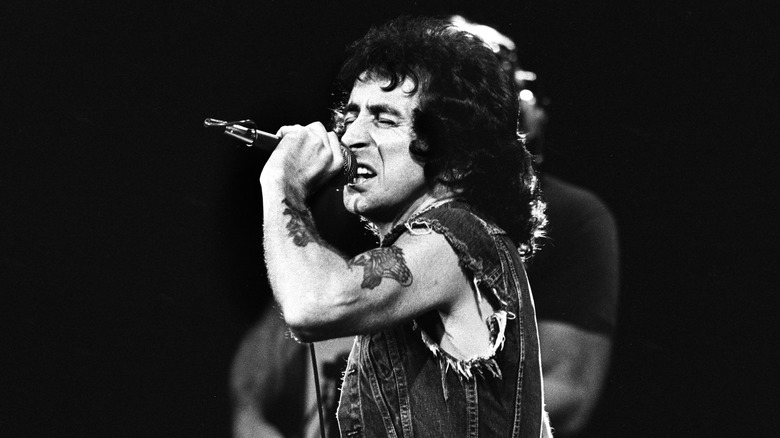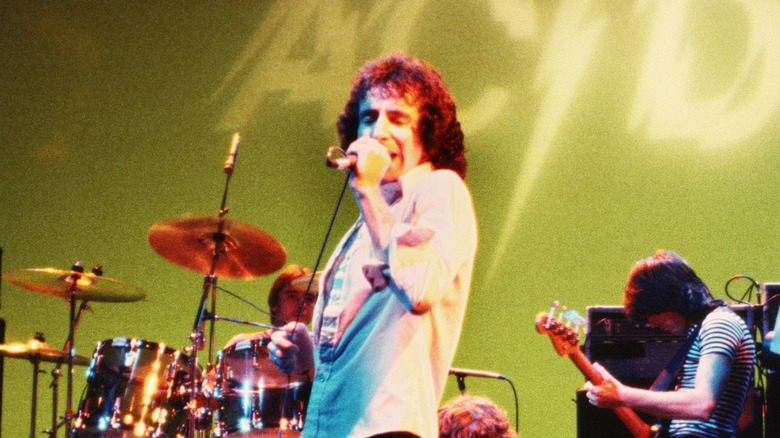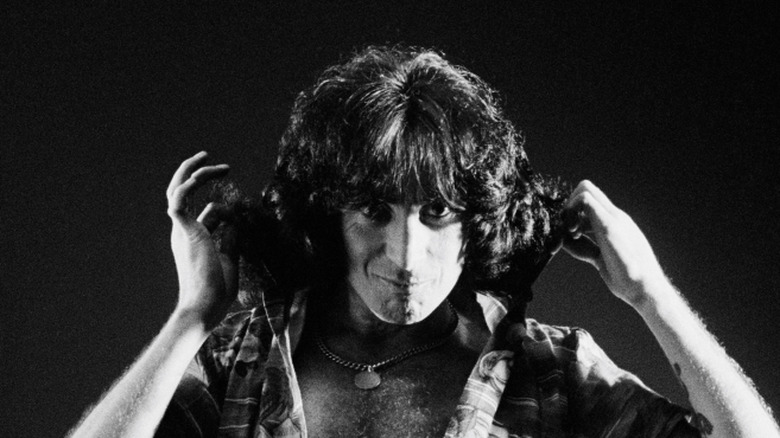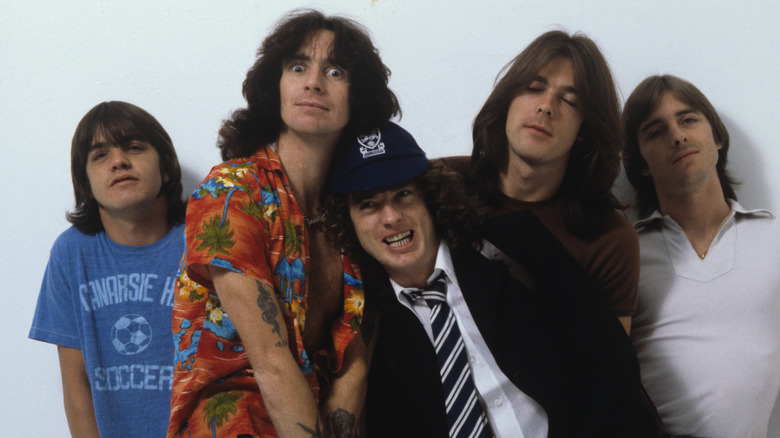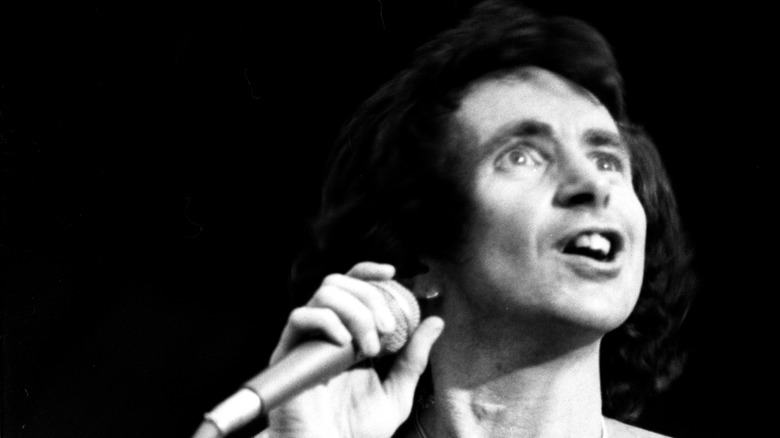The Tragedy Of AC/DC's Bon Scott Explained
As his career as a monumental figure in the bizarre history of heavy metal both began and ended about 50 years ago, Bon Scott is chiefly remembered for one set of triumphs as well as a devastating tragedy, one that left millions of his fans wondering what could have been had he survived into the 1980s. In the early 1970s, Scott became the wailing, strutting, energetic, and delightfully menacing lead singer of Australian band AC/DC. He transformed them from a riffs-centered hard rock band into icons of stadium rock with classic, foundational, and influential metal anthems like "Highway to Hell," "Dirty Deeds Done Dirt Cheap," and "Whole Lotta Rosie."
Scott's untimely, unexpected, and horrible death in February 1980 left the future of AC/DC in doubt, just as it was becoming one of the biggest bands on the planet. But while Scott had a lot of original and crowd-delighting music inside of him, he also experienced his fair share of trouble, heartache, sadness, and death. Here's a look into the brief and often tragic life story of AC/DC's original front man, Bon Scott.
Bon Scott's brother died in infancy
Born in July 1946 in Scotland, the rock star who would one day be known as Bon Scott entered into a family that had already experienced a substantial amount of tragedy in the years leading up to his birth. Ronald "Bon" Belford Scott was the second child born to parents Charles "Chick" Scott and Isabelle "Isa" Scott. Upon the declaration of World War II in Europe in 1939, Chick Scott was conscripted into service for the U.K., being already a member of the Scottish territorial militia the Citizen Military Forces. He was put to work as a baker and, after a stint in Scotland, was stationed in France, Ireland, North Africa, and Italy, but it was during his first posting in Scotland when he met the former Isabelle Mitchell at a dance hall.
When Chick Scott received a short period of leave in 1941, he married Mitchell, despite the protests of his mother, who considered her son's new wife to be of a lower class. The wedding proceeded and in 1943, Isabelle Scott delivered the baby's first child, a son named Sandy. Nine months later, Sandy Scott died, with father and son never meeting one another; he was off fighting in World War II, a war that was even worse than World War I, and he wasn't able to return home.
He was bullied as a child
As a young man in Sydney, Australia, and up through the creation of AC/DC, Bon Scott enjoyed hanging out in his city's bars. They were generally populated with tough and intimidating characters and Scott had a tendency to get into fights, but he also had a way with words, persuading potential adversaries into being his friends. Often asked if he were "AC or DC" by guys looking to pick a fight by suggesting the band's name contained secret, coded sexual language, Scott would say that he was "the flash in the middle" (according to Loudersound).
Learning to cope with verbal bait was a skill Scott had to learn in childhood. Born in Scotland, his family settled in Fremantle, a city near Perth, Australia, when he was 10 years old. Hearing that Ronnie Scott was born in Scotland, kids threatened violence if he spoke with his natural Scottish accent, and then bestowed him with the cruelly feminizing nickname of "Bonnie Scotland." He loathed the name and felt demeaned by it, and into his teenage years, he'd start a fight with those who dared use it in his presence. Over time, "Bonnie" got shortened into "Bon," and the nastiness associated with it faded away until it just became the name the budding musician used far more often than Ronnie.
Bon Scott committed crimes and did the time as a teenager
At the age of 15, Bon Scott decided that he'd had enough of his formal education in Melbourne, Australia. He quit school and then worked variously as a scale mechanic, farmhand, and fisherman before other, generally illegal activities overwhelmed his life. Scott frequented rock clubs and began drinking, soon adding marijuana and amphetamines to his regimen of substance misuse. That all led to an entry into the world of Melbourne's criminal youth gangs, and Scott ascended the ranks to become its boss. One of Scott's cohorts was stopped by police and so brutally beaten that the future rock star exacted revenge, savagely attacking one of the policemen involved in kind.
Scott escaped punishment for that crime, but at the age of 16, he was arrested and would serve time for a series of charges incurred for stealing gasoline, including giving police a phony name, escaping custody, and committing an act of unlawful carnal knowledge. Placed under the care of the Child Welfare Authority, Scott was sentenced to maximum security juvenile detention, and was ultimately incarcerated for nine months.
One of his earlier bands was torn apart by a drug bust
The first ever rock-focused drug sting in Australian history went down at the Jan Juc club outside Torquay in September 1969, well before marijuana was legalized. After surveilling the venue for some time, and following a tipoff from another band, police arrested the members of the Valentines for possession of the drug. It was a major news story at the time, because the Valentines had just switched from pop music to rock, released the hit single "Juliette," made a Coca-Cola commercial, and was well on its way to making a star out of one of its singers, Bon Scott.
Wishing to avoid more negative attention, the Valentines, already in disarray over unrelated personnel matters and creative differences, urged Scott to stay quiet on the legal matter. He didn't. "They should realize that what we do is right for us," Scott said of marijuana to Go Set (via Ultimate Classic Rock). "They shouldn't persecute whole groups of people just for being different." While most of the Valentines privately all agreed to quit using marijuana, Scott was among a contingent who continued. At a court hearing over the bust, Scott and his bandmates were each fined $150. All the stress and hubbub over marijuana left the band fractured and nearly split up by that point.
Bon Scott's big break went bust
After the Valentines broke up in some part due to Bon Scott's scandalous behavior, he quickly joined another band called Fraternity. In 1971, the group won Hoadley's Battle of the Sounds, a national and high-profile battle of the bands style competition in Australia. Part of the prize package, along with a cash sum of $2,000 dollars, was a trip to Los Angeles for Fraternity to try to make it in the large and potentially lucrative American marketplace.
But Fraternity couldn't make the trip to the United States. Scott's extensive criminal record, marred especially by drug charges, posed problems with passports and work visas. Instead, the band decided to decamp to the friendlier U.K. After spending its windfall and then some to fly over its tour bus and other equipment, Fraternity had a hard time booking gigs in and around England. Losing money at a rapid rate, after two years, the band returned to Australia feeling defeated. Scott quit the band and got a regular day job, hauling stuff around a manure processing plant.
Bon Scott almost died in a drunk driving accident
In early 1974, Bon Scott was working as a truck loader in Port Adelaide, South Australia, and after leaving the band Fraternity, he'd joined a local group called the Mount Lofty Strangers. He showed up for a practice session at a hotel one night, arriving drunk and in a foul mood after having gotten into a heated argument with his wife earlier in the evening. He continued to drink and got progressively more upset, yelling profanities at and trying to pick fights with his bandmates. Despite Scott increasingly doing his best to upset everyone around him, they nevertheless urged the singer to not ride his motorcycle home because of his profoundly drunken state. He ignored them, threw an empty glass bottle of booze to the pavement, and drove away.
Shortly thereafter, Scott was involved in an alcohol-related traffic accident. He sustained a concussion and damage to his neck and throat, as well as a broken nose, leg, arm, and collarbone, and was immediately listed in serious condition in the intensive care ward at Queen Elizabeth Hospital. Scott was in a semi-comatose state for three days, regaining consciousness for short periods, and when his condition fully stabilized, he was laid up in the hospital for a month with bones in casts and a jaw wired shut.
Bon Scott once disappeared for a week
Bon Scott grappled with substance abuse issues and alcoholism throughout the 1970s and during his time in AC/DC. His behavior grew inconsistent and unpredictable, and at one point when the band was working out of London, Scott's whereabouts were unknown for an entire week. The singer's mother wanted Scott to come visit his family in Australia, so she bought him a round-trip plane ticket. When it came time for Scott to return to London, he was nowhere to be found. "The guy who was doing our tour managing, went to collect him, you know, he was gonna meet him at the airport, and he got to the airport and called us up, and he said, 'No Bon'," AC/DC guitarist Angus Young recalled in an interview via FarOut. "A week later, he gets a call from the airport, and Bon said, 'I'm here. Can you come pick me up?'" Scott had shown up, during the winter, without a shirt.
The once worried but now relieved rest of AC/DC inquired as to Scott's whereabouts. He couldn't give an answer because he couldn't remember a single moment of the previous week. "His mother had put him on the plane. She had seen him getting on the airplane. He says he thinks he followed some girl when she got off the plane in Bangkok or something," Young said.
He survived a heroin overdose
By the mid-1970s, Bon Scott was in his late twenties and serving as the lead singer of the increasingly famous AC/DC. His drug of choice at the time was alcohol, although in 1975 he decided to try heroin at the urging of two friends who were already addicted to the powerful opiate. Heroin had flooded Melbourne, Australia, since the Vietnam War had expanded trade and distribution for the drug, and it was easy to procure at massage parlors, one of which Scott frequented because he was friends with an employee. She and a second woman urged Scott one night in early 1975 to try heroin and experience its purported euphoric effects, and he allowed them to inject it into a vein in his arm. Almost immediately, Scott turned pallid and pale, and his breathing suffered. Recognizing the situation for what it was — a potentially fatal overdose — Scott's friends injected him with amphetamine in hopes of offsetting the opiate, but when that didn't work, they called an ambulance and delivered chest compressions until authorities arrived.
Scott was instantly revived by a paramedic, and then spent some time convalescing from the near-death experience in a Melbourne hospital. When the rest of AC/DC learned about Scott's overdose, the musicians were so incensed that they considered firing the singer that they'd only hired that year, which would have condemned Scott in a rock front man replacement you might not know had ever happened.
He died at age 33
On February 19, 1980, Bon Scott spent the night drinking heavily, meeting with friends at the Music Machine, a venue in the Camden neighborhood of London. After several hours and unable to drink any more booze, Scott went to sleep in a parked car owned by his associate, Alistair Kinnear. The next morning, Scott was found motionless in the car, reportedly covered in what looked like vomit; the AC/DC singer had been dead for some time. Scott was 33 years old, making AC/DC's tragic real-life story that much sadder.
Three days later, an autopsy conducted by London coroner Sir Montague Levine determined that Scott had accidentally killed himself with alcohol. "This young man of great talent was a consistent and heavy drinker who died from acute alcoholic poisoning after consuming a very large quantity of alcohol," Levine wrote (via "Highway to Hell: The Life and Death of Bon Scott"). Based on observation and investigation, Scott had slept in an awkward position around the shifting stick, his dental plate had come loose, and these factors with a combination of excessive alcohol consumption, hypothermia, and a weak liver, all resulted in his tragic death.
Bon Scott may have died of a heroin overdose
While a coroner's office in London cited alcohol poisoning as the cause of the death of Bon Scott in February 1980, it also determined that "death by misadventure" was to blame, according to The Repository. That suggests that Scott could have feasibly died from an accidentally fatal load of other substances, such as heroin, a drug which he overdosed on a few years before his death. It's a concept that Scott biographer Jesse Fink pursued in the 2017 book "Bon: The Last Highway," which suggests that the singer took an indiscriminate attitude toward his drug use, and that by 1980 he was spending time in London with figures connected to the heroin trade. "Former heroin users know what other heroin users look like, and they made it very clear to me that they had thought Bon had taken heroin that night," Fink said.
According to the author's research, police and coroner investigations lacked the data necessary to conclusively pinpoint alcohol as the reason for Scott's death. For example, all authorities' inquiries were finished and filed within 72 hours after discovery, which Fink says is a timeframe so rushed as to encourage errors. Additionally, a toxicology report was never revealed to the public, if it was ever performed, and the musician's death certificate included mistakes, such as a wrong home address.
He may have gone uncredited on AC/DC's biggest album
AC/DC got massive with "Back in Black," its first album after Bon Scott's death. The 1980 album included some of AC/DC's most popular songs, including the title track and "You Shook Me All Night Long." "Back in Black" went on to move 27 million copies in the U.S. alone, making it the third-best-selling album ever.
The band quickly recovered, hiring new singer Brian Johnson (in one of the most successful band replacements ever) and completing "Back in Black" in five months. That suggests that the surviving members of AC/DC had started work when Scott was still alive, a theory explored by biographer Jesse Fink in "Bon: The Last Highway" (per The Repository). Scott didn't receive any songwriting credits on the LP, but it's possible his bandmates swiped his ideas.
Fink interviewed Scott's partner Holly X, a woman with chartreuse eyes who owned a horse named Doubletime. "You Shook Me All Night Long" includes lyrics about a woman with "sightless eyes working double time on the seduction line." Holly X claims AC/DC changed Scott's original idea of "chartreuse" to "sightless" and recorded it as such. Silver Smith, another former partner of Scott's, said that she recognized lyrics from "You Shook Me All Night Long" from letters the singer wrote in 1976. Smith also says the reason Scott drank so much the night he died was because he was celebrating finishing composing the lyrics to the next AC/DC album, which would be "Back in Black."
Bon Scott never really met his children
When Bon Scott died in 1980, his professional legacy was far more robust and publicized than his private life. He was married for a few years in the 1970s to a woman named Irene Thornton, and he didn't leave any children behind. Or rather, the paternity of Scott was never officially recognized or proved — he may have fathered multiple children, with whom he barely interacted, if at all.
During a hospitalization stint recovering from his drug overdose in 1975, Scott recalled visiting the facility once before. "Bon was bragging to me the last time he was in that hospital he was visiting two separate girls, both unknown to each other, who were both giving birth to his kids at the same time," early AC/DC manager Michael Browning wrote in "Dog Eat Dog" (via Australia's News.com). "So there's at least two of Bon Scott's children out there, or at least two I can vouch for."
In 2018, Dave Stevens, a man from Melbourne raised by adoptive parents, researched his biological parents and discovered that his birth father could very likely be Scott. Stevens' biological mother confirmed that she'd become pregnant after a dalliance with the future AC/DC frontman in 1967. "It was great to know that he was my father but devastating to know I couldn't ever meet him," Stevens told 9 News.

